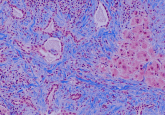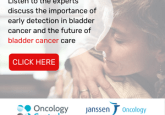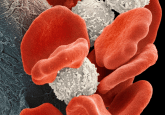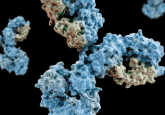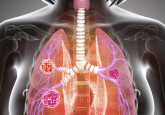Why is personalised medicine vital to managing lung cancer?
Important information
The following feature is intended for healthcare professionals in the EMEA region only. The following feature is not intended for UK HCPs. Please tick the box below to confirm that you are a non-UK healthcare professional in the EMEA region.
Hello and welcome to the latest episode of OC Talks, the podcast from Oncology Central. I am Jade Parker, Senior Editor of Oncology Central. Today I am joined by Laetitia Decroix Guilloux, Vice President of Oncology and EMEA Commercial Strategy Lead at Janssen, to discuss the patient journey through lung cancer, examine the lung cancer paradigm, and how the cancer research community can holistically address unmet needs in cancer. Laetitia, thank you for joining us, it is great to have you on the podcast.
How serious is lung cancer and what is the impact of lung cancer on both patients and carers?
Lung cancer is the leading cause of cancer mortality worldwide. It goes up to 1.8 million deaths within a year,i and these are the number of deaths that have come out, unfortunately from last year. When we are looking at the EMEA region, it is roughly 520,000 patients that are being diagnosed with lung cancer, and these numbers are from 2020,ii so it is really a very serious disease that is very prevalent. It is the biggest cancer killer, with more deaths than breast cancer or prostate cancer combined.ii Over half of the people diagnosed with lung cancer will die within 1 year of diagnosis.iii As such, there is really an urgent medical need to address the impact of lung cancer on patients, their carers and European healthcare systems. Lung cancer currently is the highest total annual economic burden of all cancer in Europe at €19 billion.iv
What are the current unmet needs which should be addressed to overcome lung cancer and how can we reduce the burden of lung cancer?
When we look first at the median 5-year survival rate for lung cancer patients, it is less than 18%.iii There are currently multiple points across the lung cancer journey that can be addressed to reduce lung cancer. So, I will be highlighting three of them. First of all, prevention and enhanced disease awareness; stopping people from smoking and making people more aware of the symptoms of lung cancer. These can include a cough that does not stop, after 2–3 weeks, or a cough that gets worse, chest infections that keep coming back, coughing up blood, persistent breathlessness, or chest pain, and persistent tiredness or lack of energy.
Many of these symptoms, when we are looking at COVID – they could be mistakenly diagnosed, so it is very important to ensure that people are made aware of them and do not delay seeing their doctors and getting tested. So, this is apart from the smoking people. There is also the fact that there are some subgroups of patients that also have lung cancer that are not smoking. But for these individuals, the symptoms that I just highlighted beforehand are also extremely important.
The second point is the interception. For this, what do we mean? We mean that we want to use diagnostic tools and using surgical intervention to intercept early. For this, we should be focusing on improved access to genetic and biomarker testing, as they have a significant, or could have a significant impact on the outcome for patients and their quality of life. Thus, it is important to ensure that testing is as accurate as possible and moreover, available to all patients across the world. Unfortunately, when we are looking at lung cancer, it is the treatment – effective targeted treatment options have been limited for patients. We need to continue our mission to deliver treatment solutions that are precise and personalised to the patient’s needs and specific to their disease.
You just touched on personalised medicine there. Why is personalised medicine so important for managing lung cancer? What does personalised care involve for lung cancer?
Lung cancer is not a single disease, and it can occur in different types of lung cells, and even within the same cell type, it can be determined by different molecular abnormalities.v Thus, predictive biomarkers are essential to identify patients with molecular targets. These patients are expected to respond better to targeted therapy than to standard therapy.vi In personalising treatment to a patient’s individual circumstances, we must first identify the cancer cells of origin. Within, 10–15% of cases, small cell subtypes are the most prevalent, with the greater majority being NSCLC.v
In recent years, there has been considerable advancement in our understanding of the molecular mechanisms responsible for the NSCLC development and progression in particular groups of patients. This has influenced the development of targeted therapies that can be more effective and better tolerated, and actually prolong life.v As with many cancers, it is now common for doctors to test lung cancer tissue for molecular abnormalities before recommending personalised treatments. These abnormalities or biomarkers can predict a good response to specific classes of drugs and they can also mean that if they are not well-treated, it can be negative in terms of the outcome.v
Thank you, Laetitia. Lung cancer awareness month (LCAM) took place last month. Why is this an important milestone for the lung cancer community?
LCAM is an important time for us to recognise the challenges and unmet medical needs faced by the lung cancer community, highlighting the importance of improved diagnosis and treatment options. It is also an opportunity to recognise the innovation and scientific advances taking place in the space and the importance of working together to improve outcomes for patients. At Janssen, to show our support to the lung cancer patient community and recognise the importance of peer-to-peer this LCAM. We published a series of films where lung cancer patients candidly share their personal journeys and the challenges they face. These interviews, filmed earlier this year, really highlight the need for improved prevention, interception, as well as treatment solutions.
Thank you so much for taking the time to speak with us today, Laetitia. It has been very insightful to hear about the societal impact of lung cancer, and also how we can address it holistically across the patient journey for prevention, early diagnosis, interception and treatment. Thank you, also, to our listeners. If you would like to hear more podcasts like this, please head to www.oncology-central.com.
In association with
The opinions expressed in this interview are those of the author and do not necessarily reflect the views of Oncology Central or Future Science Group.
i Bray, F, Ferlay, J, Soerjomataram I et al. (2018). Global cancer statistics 2018: GLOBOCAN estimates of incidence and mortality worldwide for 36 cancers in 185 countries. CA: A Cancer Journal for Clinicians, 68(6), 394–424. https://doi.org/10.3322/caac.21492ii Globocan. Cancer Today. Estimated number of incident cases and deaths Europe, Middle East and Northern Africa (MENA), Africa, both sexes, all ages. Available at: https://gco.iarc.fr/today.
Accessed November 2022.
iii Zappa C et al. Non-small cell lung cancer: current treatment and future advances. Transl. Lung Cancer Res. 5(3): 288-300 (2016).
iv Luengo-Fernandez R, et al. Economic burden of cancer across the European Union: a population-based cost analysis. Lancet Oncol. 14(12):1165-74 (2013).
v Personalised medicine at a glance: lung cancer. Available at: www.esmo.org/for-patients/personalised-medicine-explained/Lung-Cancer
Accessed November 2022.
vi Mok, T. Personalized medicine in lung cancer: what we need to know. Nat. Rev. Clin. Oncol. 8, 661–668 (2011). https://doi.org/10.1038/nrclinonc.2011.126

